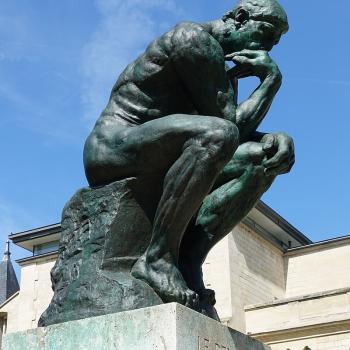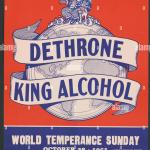Hello Darkness My Old Friend? Questions and Thoughts about Barbara Brown Taylor’s Discovery of the Sacrament of the Dark
When I saw the cover of the April 28, 2014 Time I had to buy it. I’m a sucker for theology in pop culture and journalism. The cover shows a railroad track surrounded by trees at night. The title is “Finding God in the Dark: Beyond enlightenment: Acclaimed preacher Barbara Brown Taylor argues that strength, purpose and true faith are found in the shadows.”
What caught my attention was “Barbara Brown Taylor.” For the past almost twenty years my pastors have probably quoted her more than anyone else (outside the Bible) in their sermons. I haven’t read any of her books, though I admit I probably should. But if I pieced together all the quotes attributed to her by pastors and guest preachers I’d probably have a book.
Inside the magazine, the cover article begins with a black page with white letters: “Let There Be Night: Darkness is often treated as evil, a vast unknown and the ultimate spiritual enemy. But as Barbara Brown Taylor believes, it may save us all.” The next page shows a black-and-white (or shades of grey) photograph of Brown.
According to the article, Taylor, “who ranks among America’s leading theologians,” has written a new memoir entitled Learning to Walk in the Dark. Taylor’s thesis is that “Contemporary spirituality is too feel-good, that darkness holds more lessons than light and that contrary to what many of us have long believed, it is sometimes in the bleakest void that God is nearest.”
The article implies that, according to Taylor, spiritual seekers, including Christians, need to overcome any idea that darkness is bad and get not only comfortable with it but also discover God there in a way God is not found in the light. She is not merely speaking metaphorically; she means literal darkness is or can be a sacrament of grace in a way light is not. However, there’s also a metaphorical note to her spiritual discovery. Often, according to the article, anyway, darkness is symbolic of doubt, depression, spiritual emptiness and struggle.
The article even contains illustrations for “Following Darkness Where She Leads”: walking slowly at night, watching the moonrise, unplugging all devices at night, sitting alone in a closet. Taylor is quoted as saying “Nothing reminds me that I am an earthling like seeing the full moon. Years of Christian training fall at my feet like paper clothes set on fire by sight. I want to dance and shake a rattle.” Dance and shake a rattle in the moonlight?
There is a strain of disdain for Christian tradition in Taylor’s newfound spirituality of darkness. Throughout the article she expresses belief that the Bible’s and Christian tradition’s emphasis on light is mistaken and even harmful. She finds help in non-Christian traditions as well as in certain strains of Christian mystical spirituality. I couldn’t help but think of John of the Cross’s “dark night of the soul” as I read the article even though that is never mentioned.
I do not want to be like those shrill, always critical fundamentalists that fill Youtube with rants against everyone and everything with which they disagree. And I want to keep in mind the saying “Never blaspheme the sacrament you don’t understand” (Daniel Epstein). But I can’t help raise some questions about Taylor’s spirituality of darkness.
I wonder if there is perhaps a good reason why the Bible, Jesus and Christian tradition, for the most part, endorses light rather than darkness as a metaphor for spirituality. Of course, this reason is never made explicit and perhaps the Bible’s writers, Jesus, the apostles and great Christian thinkers didn’t know it. But now we know (and I assume God has always known) that light is something and darkness is nothing—except the absence of light. Darkness has no substance, so to speak, whereas light does. Exactly what light is is a mystery, but every modern physicist knows it is not nothing but something. It has being.
I have no doubt that an over abundance of light can send one searching for respite in darkness. Is that what Taylor is saying? That contemporary spirituality is too high on “light” and she finds solace, respite from the hype in darkness? But isn’t her spirituality of darkness, making darkness a sacrament, an overreaction?
It seems to me there are good reasons, besides the physical (or metaphysical) one I mentioned above, for identifying darkness with evil. It’s not that darkness is itself evil; it’s that evil (very broadly defined) tends to work more in darkness than in light. That’s why many women (and some men) do not go to a store, for example, at night alone—especially if that requires walking through a dark parking lot. That’s just wise. Lots of harmful things come out at night that don’t come out in broad daylight. Lots of people do things in the dark they would never do in the light.
There can really be little doubt that the Bible itself links darkness with evil and light with good in a way that can hardly be considered merely metaphorical—as if the associations were arbitrary. For example, 1 Peter 2:9 says that we who are God’s people were called by God out of darkness and into God’s marvelous light. This is just one example. I cannot think of any biblical counter example—where light is used for evil and darkness for God’s gift of salvation. (And please, don’t anyone mention “Lucifer” or Satan as a counter example. According to tradition he was a “morning star” before he fell and Paul says he disguises himself as an “angel of light.”) Darkness, if I’m not mistaken, is at best used as a transitional state before and to light.
Please understand that I am not denouncing Taylor or her preference for darkness. I’m questioning the theological appropriateness of a spirituality of darkness and of making darkness into a sacrament—as Taylor seems to be doing according to the Time article.
Why does this matter? Simply because Taylor is a great hero and mentor-from-afar for many Christians and especially, I think, for Christian women in ministry (or moving toward ministry). This is a matter for careful discernment for them. For all her great gifts, is Taylor’s recommendation of a spirituality of darkness really compatible with Scripture, Christian tradition, reason and experience?
















